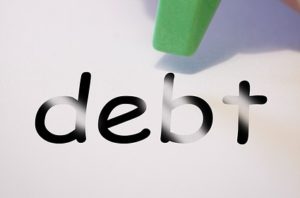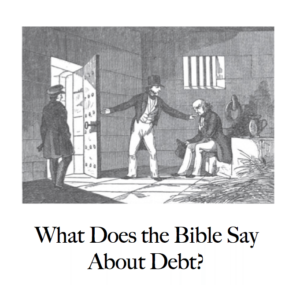 It Isn’t Worth It to Be Embarrassed About Your Debt
It Isn’t Worth It to Be Embarrassed About Your Debt
Debt can feel like a dark cloud hanging over your head, weighing you down with guilt, stress, and—let’s be honest—shame. If you’re ashamed of bankruptcy or debt, you certainly aren’t alone.
Maybe you’ve told yourself, “I should’ve known better,” or “I don’t want anyone to find out.” But here’s the thing: the system is often set up to get us into debt. When that system fails us, it’s not a moral issue to make a mistake or fall behind.
Let’s break down why debt doesn’t define you, how bankruptcy works, and why you shouldn’t let embarrassment stop you from getting the help you need.
 Debt Happens to Good People
Debt Happens to Good People
Life throws curveballs. Maybe you had medical bills you didn’t plan for, lost your job, or faced an emergency that your savings couldn’t cover. Or maybe you just got in over your head with credit cards while trying to keep up with rising costs. These are things that happen to millions of people, and none of them make you a bad person.
In fact, credit card companies often target the most vulnerable people:
- young college students just learning to live on their own
- people deep in medical debt with no where else to turn
- and many other examples of people who did nothing wrong
They know you might get in over your head. And they know many people don’t understand credit scores, interest, and other factors that come into play. But they still offer the credit and then hold you responsible.
Fortunately, you have options. What matters now is how you move forward—and bankruptcy could be the solution that gives you a fresh start.
 “I regret not filing sooner”
“I regret not filing sooner”
Rachel Kramer Bussel recently told the New York Times how she left law school with $30,000 in credit card debt. She’d enjoyed her 20s without thinking about the consequences, especially to her credit score.
After not graduating from law school, her income barely covered rent and student loans, let alone credit card payments. Interest kicked in, and the balance ballooned.
She felt more and more embarrassed by her choices and finally confided in a friend. He told her never to declare bankruptcy, and so she didn’t.
“Instead,” she says, “I consolidated my debt with a service that promised to streamline the repayment process. But because my monthly income wasn’t high enough to pay extra toward the principal, I didn’t make much headway after several years of making payments.”
“So I researched bankruptcy options, discovered that I was eligible and decided to file. The process was far less painful than I had anticipated, wiping my debt slate clean.”
“I regret not filing sooner.”
She was ashamed of bankruptcy beforehand, but then she learned to think of it in a new way: it’s a chance to make things right so you can start fresh and reclaim your life.
 The Two Types of Bankruptcy You Can Consider
The Two Types of Bankruptcy You Can Consider
When you’re dealing with overwhelming debt, there are two main types of bankruptcy to consider: Chapter 7 and Chapter 13. Let’s break them down so you can understand your options.
Chapter 7 Bankruptcy
Chapter 7 eliminates most unsecured debts – like credit cards, medical bills, and personal loans – so you can start fresh. The process is relatively quick, usually taking just a few months.
And just because it deals with unsecured debts, that doesn’t mean you’ll lose everything you own. You can often keep your essential assets—like a home, car, and personal belongings—thanks to exemptions. A trusted bankruptcy lawyer can talk you through how this option might work for you and what to expect.
To qualify, you’ll need to pass a “means test,” which compares your income to the median income in your state. If your income is below the threshold or your disposable income is very low, you likely qualify.
 Chapter 13 Bankruptcy
Chapter 13 Bankruptcy
Instead of wiping out your debts immediately, Chapter 13 allows you to set up a repayment plan to pay off some or all of your debts over three to five years. Chapter 13 is a good option if you have a steady income and want to catch up on missed mortgage payments or car loans while keeping your assets.
Chapter 13 is a powerful tool because it allows you to restructure your debt in a manageable way, designed specifically for you. And it has the power of the courts behind it. In the New York Times example above, the author first tried a debt consolidation company, but the payments weren’t affordable and she ended up right back where she started. That doesn’t happen with Chapter 13.
To qualify, you’ll need a reliable income to make monthly payments and meet the debt limits for Chapter 13.
A great bankruptcy lawyer can help you figure out which bankruptcy chapter works best for your financial situation and future goals.
Breaking Free from Shame Over Debt
The hardest part about dealing with debt isn’t the numbers – it’s the shame. Many people avoid filing for bankruptcy because they’re afraid of what others will think, or they see it as admitting defeat.
But here’s the truth: there’s nothing shameful about taking control of your finances.
Remember, Bankruptcy Is a Legal Right
Bankruptcy exists because the law recognizes that sometimes, people need a reset. It’s not a failure—it’s a fresh start. Big corporations file for bankruptcy all the time, and they do it without a second thought because it’s a smart financial decision. You deserve the same opportunity to start over.
 Bankruptcy Law Is Built On Biblical Concepts
Bankruptcy Law Is Built On Biblical Concepts
If you’re a religious person, you might be pleased to know that bankruptcy is actually a Biblical idea. Modern bankruptcy laws are built from the concept of Jubilee found in the Bible.
I’ve studied this connection for all of my professional life, and I’ve written a free report about it called “What Does the Bible Say About Debt?” If you’re interested in the morality of bankruptcy, I highly recommend it.
You’re Not Alone
Millions of people file for bankruptcy every year. From young adults burdened by credit card debt to retirees facing medical bills, people from all walks of life use bankruptcy to get back on their feet.
You aren’t alone, and you certainly aren’t the only one dealing with debt because of a failed system.
Focus on Your Future
Think about how much energy you spend worrying about your debt. Imagine what your life could look like if you didn’t have that weight on your shoulders. Bankruptcy is about giving yourself the chance to move forward, not punishing yourself for the past.
To help you build a bright future, I’ve also written two guides to help: Life After Bankruptcy, and Rebuilding Your Credit (Even After Bankruptcy). You will see in these guides that a stable, happy financial future is absolutely possible if you choose to get a fresh start.
 Help Taking the First Step Toward Freedom
Help Taking the First Step Toward Freedom
Debt might feel like a trap, but you don’t have to stay stuck. Bankruptcy can offer relief, protection, and a way to rebuild your financial life. And there’s no reason to be embarrassed about taking care of yourself and your future.
If you’re ready to explore your options, I’m here to help. Our team understands all the emotions you’re bringing into bankruptcy, and we can help you figure out your next steps.
We’ve built a reputation for our compassion and client care. It’s how we’ve earned top ratings across the web and multiple Martindale-Hubbell awards for client satisfaction.
So let’s talk about your situation, figure out the best path forward, and create a plan that works for you. Contact me today, and let’s start turning the page to your next financial chapter—without shame, guilt, or fear.
